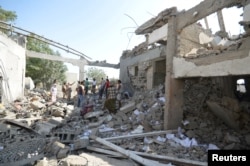The U.N. humanitarian chief warned Monday that war-torn Yemen is "one step away from famine."
Stephen O'Brien told the U.N. Security Council that more than 21 million Yemenis — 80 percent of the population — are in need of some form of humanitarian assistance.
O'Brien gave the briefing by telephone from Bahrain, where he has arrived for a 10-day visit that also will include Kuwait, Qatar and the United Arab Emirates. He traveled to Yemen earlier this month.
"Over 2 million people are malnourished nationwide, including 370,000 children who are severely malnourished," O'Brien said. That is an increase of 65 percent compared to the year before the conflict began.
Food prices have surged 20 percent since fighting began last year, and a Saudi-imposed blockade has impaired food deliveries to a country that, before the conflict, imported 90 percent of its food stocks.
In addition, cholera — the often fatal water-borne diarrheal disease — also is starting to appear, with 61 confirmed cases and 1,700 suspected cases in 10 governorates.
O'Brien said the United Nations and its humanitarian partners are establishing 21 cholera treatment centers, but that they would be insufficient to stop the escalating spread of the disease.
Additionally, the humanitarian chief said more than 10,000 children under the age of five have died from preventable diseases. Another factor that has led to the deaths of many children is the lack of immunizations and treatments for diarrhea and pneumonia since the Saudi-led coalition began airstrikes, as well as an air and sea blockade on Yemen in March 2015.
Not ‘mission impossible’
The U.N. has classified Yemen as a level three emergency — Syria and Iraq are the only other two humanitarian crises rated this severe.
"Saving lives in Yemen is doable," said WFP regional director Mohannad Hadi. "It's not mission impossible."
He said more international support is needed to accomplish it.
"There is no reason to lose one life in Yemen," Hadi added.
The U.N. has appealed for $1.6 billion to reach 12.6 million people across Yemen this year, but has received just under half of the required funds.
Political road map
Iranian-backed Houthi rebels tried to seize power from the internationally-recognized president, Abdu Rabu Mansour Hadi, in September 2014, leading to a Saudi-led aerial campaign to restore him to power the following spring. Since then, the U.N. says thousands of civilians have been killed and injured, and more than 3 million have been displaced from their homes.
On Saturday, U.N. Special Envoy for Yemen Ismail Ould Cheikh Ahmed put forward a road map for trying to arrive at a political resolution; both sides have rejected it.
He said the framework is consistent with three elements: a U.N. Security Resolution from April 2015 that reiterated President Hadi's legitimacy, imposed an arms embargo on the rebels, and demanded they withdraw from all captured areas and turn in all seized arms; outcomes of the national dialogue; and an initiative from the Gulf Cooperation Council.
He said the plan includes a set of sequenced political and security steps, conducted in parallel, which would help Yemen return to peace and an orderly political transition.
"I am very disappointed by the fact that the two parties have expressed opposition to the road map," Ould Cheikh Ahmed told reporters. He said he had not received formal, written rejection of his plan, but had read statements both sides had made to the press.
"The people of Yemen can no longer wait, because the situation is becoming disastrous," the envoy warned.
He said the road map is just that, a guide, not a final agreement, and that the parties should use it as a starting point for discussions. He said he needs strong support from the Security Council for his road map and in demanding an immediate cessation of hostilities.
Yemen's ambassador, Khaled Alyemany, said the government has made painful concessions for the sake of peace, while the rebels refuse to compromise.
"Sustained peace will not be achieved by rewarding the coup masters for their coup and handing them the authority on a plate of gold," he said.







